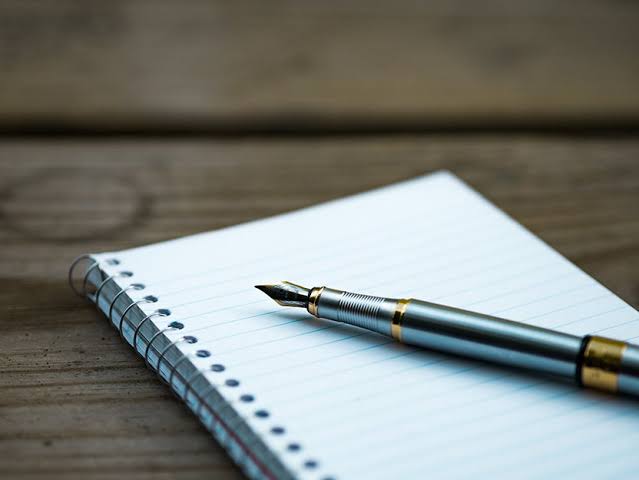The Moustached Journalist says;
Apparently, not many gave Nigeria a chance to advance to the ultimate stage of the tournament due to the coach’s controversial stance on the bloated retinue of attacking-minded players to jeopardize the essence of creativity in the midfield, minimal options in each outfield position with respect to squad depth, and numerous injuries that plagued the Super Eagles training camp in their final lapse of preparations ahead of the 34th edition of the Africa Cup of Nations (AFCON) in Ivory Coast.
With the fact that their poor form before the start of the competition were nothing to write home about, failing to win any of their 2026 FIFA World Cup qualifiers against Sierra Leone and Zimbabwe; both ended in 2-2 and 1-1 stalemates respectively. Meanwhile, they also suffered a 2-0 defeat to Guinea in a warm-up exhibition to assess their readiness for this year’s AFCON tournament.
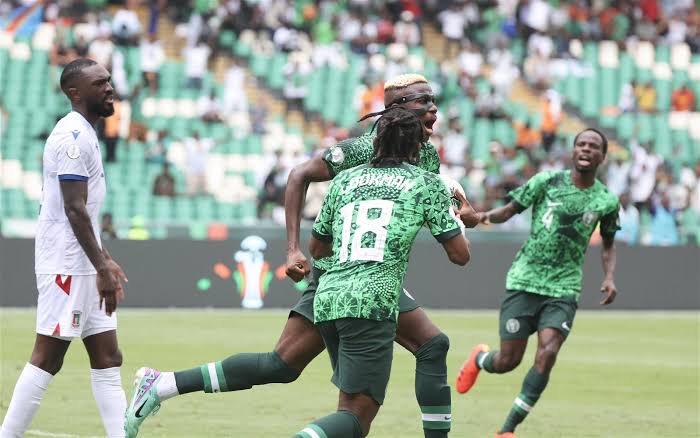
In a similar fashion in terms of progression with that of AFCON 2013 in South Africa, Nigeria’s first match was a riveting 1-1 draw to Burkina Faso, where the Super Eagles took the lead through the tournament’s top-scorer Emmanuel Emenike but Alain Traoré levelled the scoreline for Burkina Babes with minutes to full-time.
In the same manner at the ongoing 2023 edition in Ivory Coast, it also ended a disappointing 1-1 stalemate in their Group A curtain raiser with Iban Salvador opening the Nzalang Nacional of Equatorial Guinea’s highest-scoring record in a single AFCON tournament to peg the Super Eagles on the 36th minute, but was cancelled out by a Victor Osimhen’s header two minutes later.
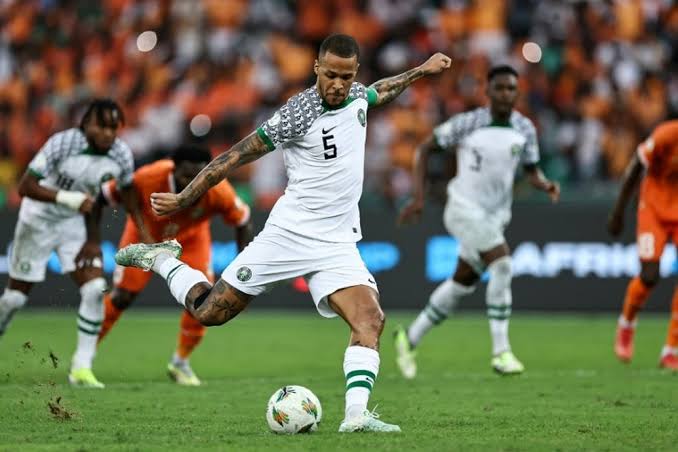
Nigeria’s second game of the group stage was the biggest test of the preliminary rounds for the three-time African champions who were in search of their first win in the tournament against the hosts Ivory Coast who had started on the right footing with a 2-0 win over Guinea-Bissau in the opening ceremony of the tournament at the Alassane Quattara Stadium in Abidjan.
Besides the need to secure maximum points, the two West African sides knew what was at stake going into the fierce showdown. Prior to their encounter at this year’s Africa’s biennial tournament, the Super Eagles had recorded a 2-1 quarter-final win over the Ivory Coast’s Les Elephants at the 29th edition held in South Africa to eventually win the championship against Burkina Faso at the AFCON 2013 final.
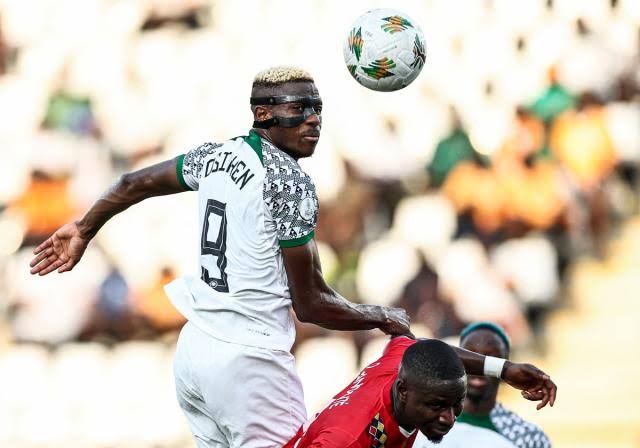
It was a hard-fought triumph for Nigeria, having won the AFCON title last in 1994. However, through the courtesy of Sunday Mba’s lone strike in the 40th minute in front of a crowd of 85,000 at the FNB Stadium in Johannesburg; the Super Eagles were able to add a third African silverware to her trophy cabinet after 19 years. Notwithstanding, one cannot overemphasize on the remarkable feat of eleven years ago without according utmost respect to the tactical ingenious of the late title-winning coach Stephen Keshi of his blessed memories.
Over a decade after, the longstanding rivalry was awoken; it was about that time for a fresh battle of two separate generations of footballing talents wrapped in their national team colours with the exceptions of now-captain Ahmed Musa and Kenneth Omeruo from the Super Eagles AFCON 2013-winning team.

Although, it was really a fully-packed end-to-end action from both sides but all it took was a William Troost-Ekong’s second-half penalty on the 55th minute to earn Nigeria her first victory from a potential six points in their two remaining games in the group stage.
It was the opposite at the 2013 edition for the Super Eagles, they saw out another 1-1 draw with the then-defending champions Zambia, as another late goal from the penalty spot by Zambian goalkeeper Kennedy Mweene cancelled out Emmanuel Emenike’s second goal of the tournament.

The last pea of the pod in Group A was to an already-eliminated Guinea-Bissau who had squandered every chance of qualifying for the knockout round, having suffered two losses against Côte d’Ivoire and Equatorial Guinea. All that was left from this encounter for the Super Eagles was to secure at least a point to book a seat in the Round of 16.
Prevailingly, an Opa Sanganté’s 37th-minute attempted clearance blasted into the roof of his own net was seamlessly enough to get the business done and dusted for Nigeria, finishing second-place with seven points behind the group winners Equatorial Guinea. It was yet another extraordinary test for the team against a Group C second-placed Cameroon in the knockout stages of the competition.
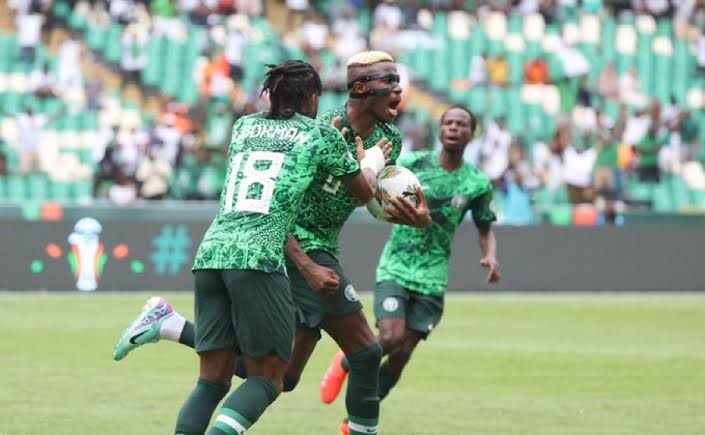
In 2013, Nigeria had to keep it late until the dearth of their last business in the group stage against Ethiopia, if not for Victor Moses who scored twice to rescue the Super Eagles with a 2-0 win to advance to the quarter-finals at the expense of Zambia who got knocked out in the group stage.
With historical encounters and group stage performances on the bright side of Nigeria, the Super Eagles were keen on making it four out of their last five meetings against Rigobert Song-led Indomitable Lions in their knockout round match of the 2023 AFCON at the Félix Houphouët-Boigny Stadium in Abidjan to continue with targeting a fourth title at the Africa’s biggest sports event.
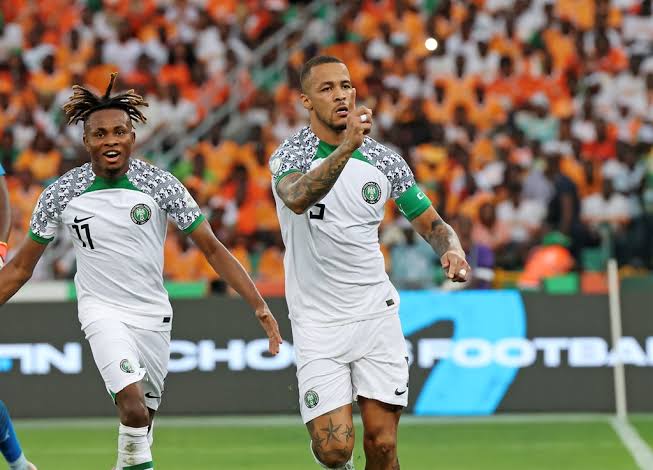
The Nigeria’s strong composure and durability at the back was fit to keep the Indomitable Lions’ offensive pressure at arm’s length without conceding a single shot on target in the entire duration of the game. An Ademola Lookman’s brace did put the Cameroonians to the sword, with a goal each in both halves to set up a quarter-final clash with Angola a week later at the same pitch.
In the last eight of the competition in 2013, Nigeria defeated the then-tournament favorites Ivory Coast 2-1 in a shocking upset where Emmanuel Emenike and Sunday Mba scored a goal each in both halves to see the Super Eagles to the semifinals.

A scintillating Angolan side led by a Portuguese gaffer, Pedro Valdemar Soares Goncalves were up against the Super Eagles in the last eight of the tournament, having defeated Namibia 3-0 in the knockout stages while topping the summit with seven points alongside Algeria, Mozambique and Mauritania in Group F.
Sadly, this was the end of the road for the Palancas Negras at the 2023 AFCON who were downed by the in-form Ademola Lookman’s strike in the 41st minute to see Nigeria through to their eighth AFCON semifinal in the 21st Century, more than any other nation. Commendably, Nigeria have now appeared 20 times in the Africa Cup of Nations and have reached the semifinals of the tournament on 17 occasions, with three African championship titles to show forth.
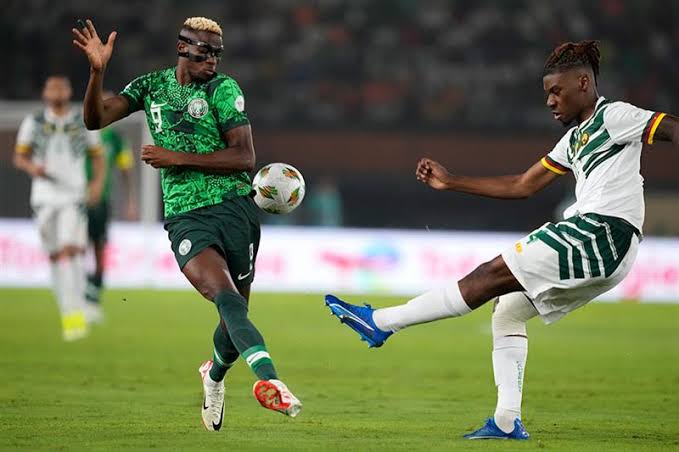
Notably, the late AFCON 2013-winning title coach Stephen Keshi’s inclusion of six home-based players in the squad paid further dividends, as Nigeria duly humiliated a star-studded Mali 4-1 in their semi-final clash with Elderson Echiejele, Brown Ideye, Ahmed Musa and Emmanuel Emenike all on the scoresheet.
The adventures became more intriguing when we had a feel of the rebirth of AFCON 2000 Semi-Final against South Africa at the Stade de la Paix in Bouaké four days ago. 24 years ago, the Super Eagles had triumphed at this very stage of the tournament in a match that ended 2-0 loss to Bafana Bafana at the National Stadium, Surulere in Lagos at the 22nd edition of the African continental championship that was co-hosted by Ghana and Nigeria.

Fast forward to the present, the future ironically becomes the past at this year’s edition of the Africa Cup of Nations in Ivory Coast in one of the final four encounters between Nigeria and South Africa. With the West African side having yet to suffer any major scare, winning four games and a draw. While, their counterparts suffered a 2-0 defeat in their opening group fixture against Mali before striving to beat all odds to the tournament’s penultimate stage.
Speaking during pre-match press conference, the Super Eagles Head Coach José Peseiro said that they are unconcerned about being the favorites ahead of the 2023 Africa Cup of Nations Semi-Final clash with South Africa rather are focused on getting the job done on the pitch.
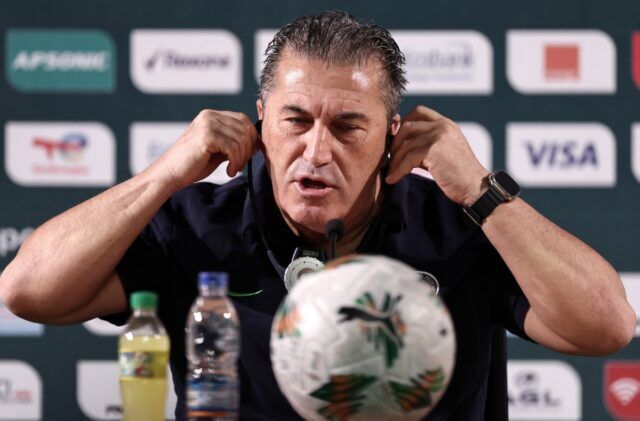
“They know they are going to play against a good team, put Morocco, one of the favorites out 2-0. We know the power of the opponent, we know they want to win like us, they have confidence, they have good organization, they want to win AFCON like us but my importance is our team.
“We want to play a good match, create opportunities, prevent opponent from creating opportunities, only that. Favourite is not in our heads. If it enters our head, it will fly, you understand. We want to put our feet on the ground,” the 63-year-old Portuguese tactician.
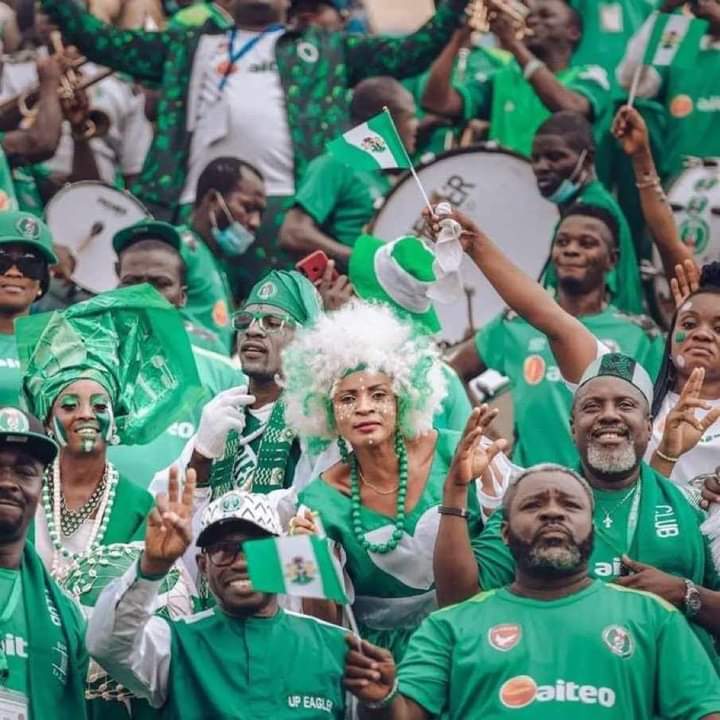
Having featured in all five games for the Super Eagles with four clean sheets in his belt, José Peseiro remained the outstanding Stanley Nwabali in goal for the umpteenth time. With the starting line-up seemingly affected by the absence of Zaidu Sanusi and Ola Aina’s adjustment to the left wing-back position while Calvin Bassey switched to the right-hand side of the duo of Semi Ajayi and William Troost-Ekong in the central defence.
Frank Onyeka held on to the centre midfield with Alex Iwobi as the pivot point between the midfielders and the attackers, flagged by Bright Osayi-Samuel and Moses Simon on both sides with Ademola Lookman behind Victor Osimhen in the centre-forward.
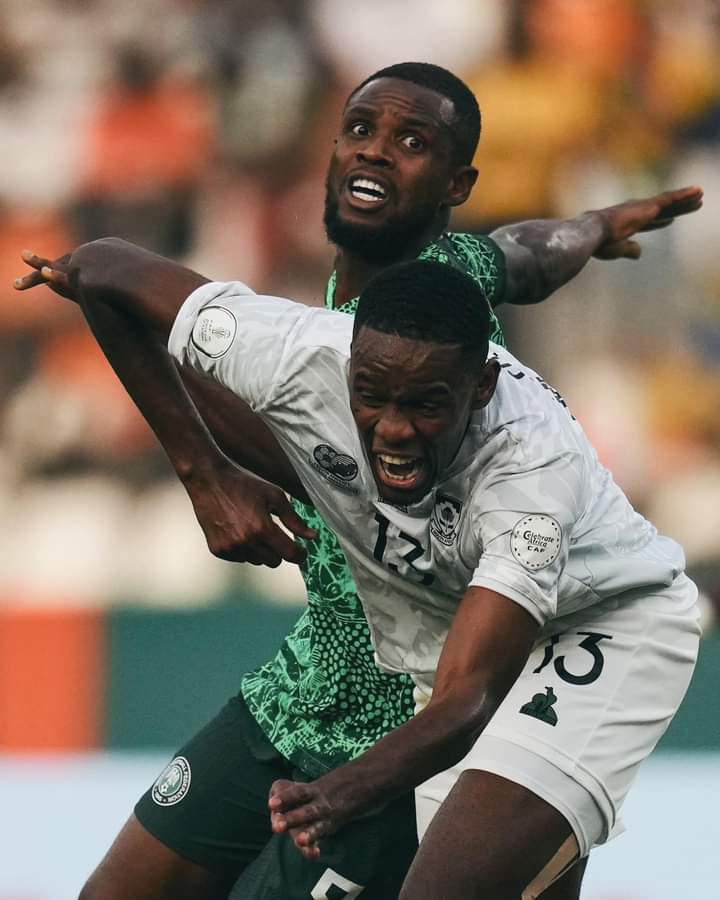
Nigeria dominated early on in the game but struggled to find their way past a South Africa’s well-organised rearguard. Meanwhile, Bafana Bafana oftentimes targeted the space between the openings in the Super Eagles defence, and that clarity of purpose helped them look more dangerous in creating goal-bound chances.
Due to the fact that the Super Eagles did not display their best football in the first half, Bafana Bafana capitalised on this imbalance, finding success with lofted passes over the Nigerian defense, while loose ball control from both defenders and midfielders provided attacking opportunities for the opponents.
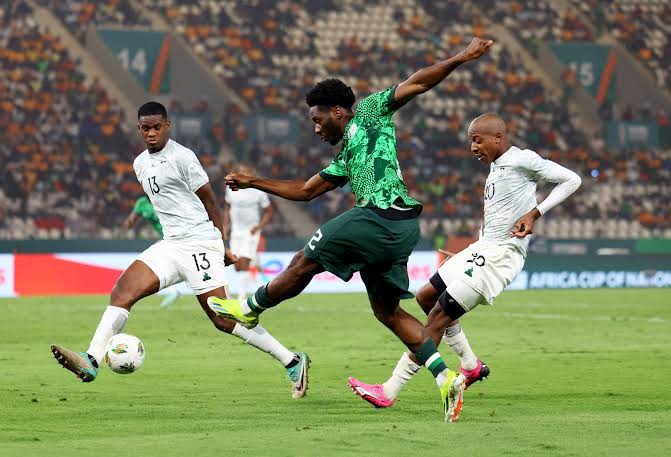
With a five-man defense in place for the Bafana Bafana when Nigeria push forward, it was even difficult for the Super Eagles to break through the South African defense, which has gained confidence with the scoreline still stale at the break.
As the game progressed in the second-half, many times did South Africa excel in exploiting short spaces in the midfield, despite resilient efforts from Iwobi and Onyeka to cover defensively. Overall, the South Africans were the superior side, boasting more possession, passes, and shots on target. For these reasons, José Peseiro had to introduce Alhassan Yusuf and Samuel Chukwueze, subbed off Alex Iwobi and Moses Simon to curtail the constant pressures in the midfield and also boost the play offensively.
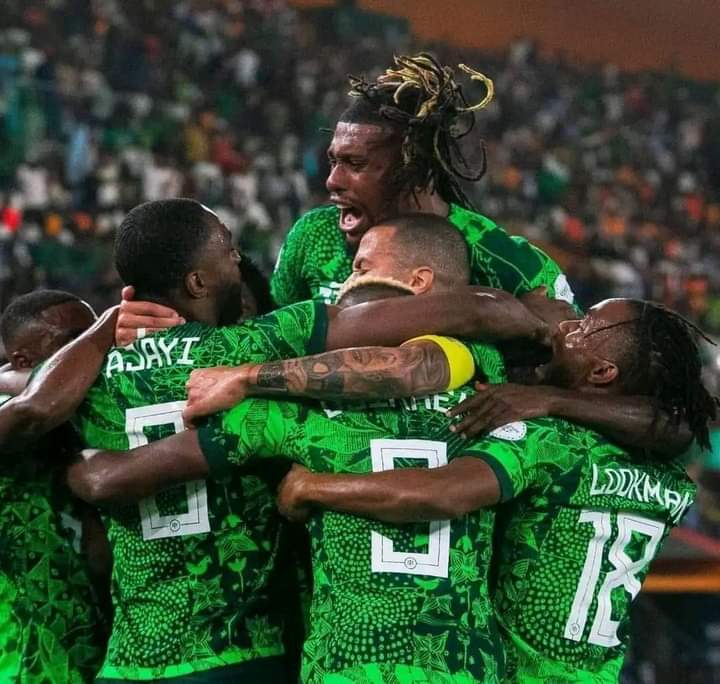
However, Nigeria picked it up thereafter, eventually forging in front when Osimhen was unruly fouled in the box as the centre referee Amin Omar wasted no time to point to the spot. The penalty kick was William Troost-Ekong to take and he did not hesitate to bury it straight in the middle of the net to give Nigeria the lead on the 67th minute.
After 85 minutes of a hard-fought back-and-forth affair, it appeared Osimhen had put the match away, tapping in a one-time cross from the far post to make it 2-0. They looked to have sealed the game, however, there was a stunning end to normal time when the Video Assistant Referee (VAR) turned the match on its head.
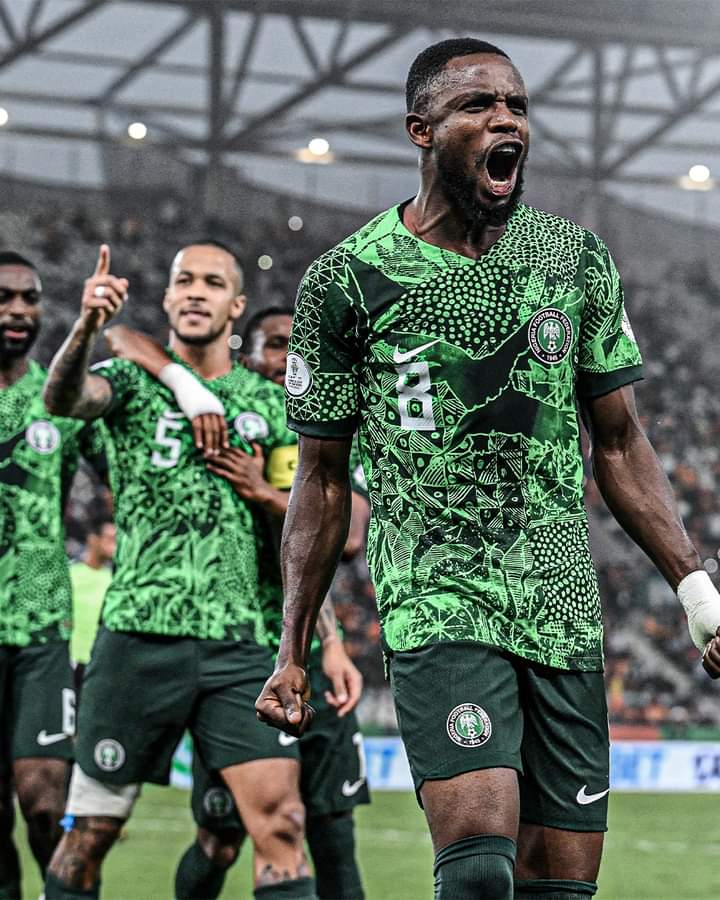
The Egyptian referee did not only disallow the goal, but pulling play back for a foul on Percy Tau by Alhassan Yusuf in the Nigeria penalty area that awarded Teboho Mokoena a chance to equalize from the spot for South Africa in the 90th minute that cracked a hole in the heart of every Nigerian home and abroad.
Surprisingly in the final minute of second-half stoppage time, Khuliso Mudau had a wide-open opportunity to snatch a dramatic last-gasp winner to put South Africa through to the final rather skied the chance, as Nigeria survived by a whisker with the match heading to extra-time.

Both sides pushed for a winner in extra time but neither managed it, though Nigeria brought in the fresh legs of Joe Aribo, Kelechi Iheanacho, Terem Moffi and Kenneth Omeruo to further withheld their grounds in the game, as Frank Onyeka, Ademola Lookman, Victor Osimhen and Bright Osayi-Samuel saw their time on the field came to an end in that order. While, South Africa only replaced Zakhele Lepasa with Nkosinathi Sibisi as it advanced to a penalty shootout after a goal-less 30 minutes.
With Ronwen Williams’ heroic display in the quarterfinal against Cape Verde where he prominently saved four out of five penalties to help South Africa book a seat in the last four. Stanley Nwabali, however, was yet to face a single penalty kick nor shootout until that moment but has done well to safeguard his team with outstanding performances.

Nigeria takes first, Moffi buried it straight into the middle and put the Super Eagles in front while Mokoena stepped up to take South Africa’s but could not find his scoring boot this time around as Nwabali saves for Nigeria. Kenneth Omeruo, however, with the simplest of kicks scored from the spot to increase the lead, but Mihlali Mayambela reduced the deficit by slotting it beyond the goalkeeper’s reach.
Meanwhile, Ola Aina blasted his penalty over the bar, as Evidence Makgopa’s miss handed the advantage back to Nigeria; all thanks to the Super Eagles goalie’s brilliant save to deny the South African.

Nigeria’s fourth kick was taken by William Troost-Ekong who did fail to put it past the South African shotstopper for the second time in the game, to hand Nigeria a two-goal lead in the shootout. However, Mothobi Mvala scored for the Bafana Bafana to give them the least of hope.
Kelechi Iheanacho converted the winning penalty as Nigeria held their nerve to nudged past South Africa in a 4-2 shootout to seal the Super Eagles’ place in the final after a 1-1 regulation draw. Setting up another rivalry with the hosts Ivory Coast, having defeated the Elephants 1-0 in the second round of games in the group stages.

Nigeria booked their place in their first Africa Cup of Nations final since 2013 after a dramatic penalty shootout victory over South Africa. This is the first time in this tournament that the Super Eagles have been taken this far in a match.
While speaking at the post-match press conference, José Peseiro said that the result was a deserving one for the Super Eagles while praising the Bafana Bafana as the most organised team in the competition.
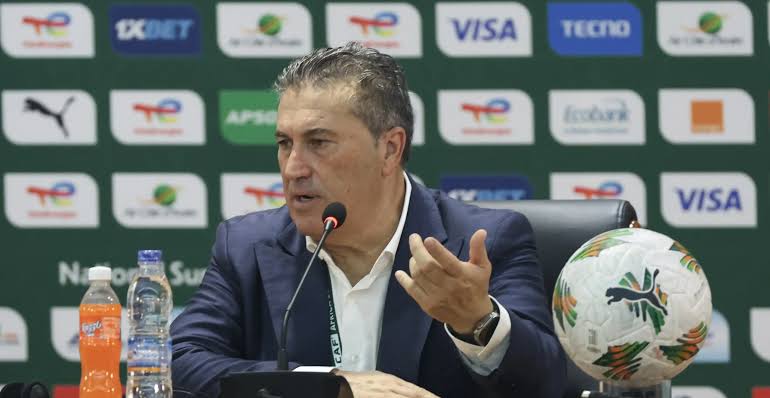
“It was a very good victory against a very good team. They created more problems for us than any other team we have faced. The players are happy. They deserve it. We deserve it. The Nigerian people deserve it. It was a very good victory against a very good team.
“South Africa has the best organisation in this competition. Because they play together many times. Most of them also play together at Mamelodi Sundowns and for that they created more problems for us than any other team we have faced in this competition. It was difficult to beat them like I had expected. So, I say congratulations to the Super Eagles and also to the South African team,” Peseiro said.
In the same light, my fellow countrymen and myself condole with all the families, friends and loved ones of the four persons who passed away in the course of supporting the Super Eagles of Nigeria wholeheartedly in their historical semi-final victory over South Africa on Wednesday night. May the souls of the faithful departed rest in peace. AMEN!

Since making it to the Africa Cup of Nations final on home soil in 2000, Nigeria’s Super Eagles have only made it that far once, in 2013, when they went all the way to win the tournament. Now, it seems we may be faced with the same good faith when Nigeria take on the hosts Côte d’Ivoire for a possible fourth AFCON title at the Alassane Quattara Stadium in Abidjan by 9pm Nigeria time on Sunday (tomorrow).
Every time it feels like the 2023 Africa Cup of Nations has finally emptied the drama tank, there has been something left to thrill the fans. However, Nigeria’s Super Eagles are the only team yet to taste a defeat in this competition and have conceded the least number of goals with nearly impeccable form, and are arguably the strongest side of the two teams contending for the biggest trophy in African football.
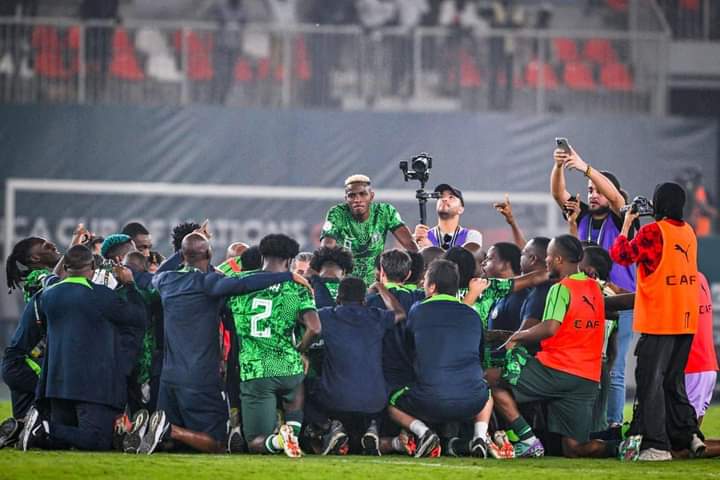
Concurrently, the Elephants of Ivory Coast have defied the odds to find their way assiduously into the tournament’s final since the last they won it in 2015 on penalties against the Chipolopolo of Zambia after crashing out the previous edition in South Africa where they suffered a 2-1 loss to the eventual winners, the Super Eagles of Nigeria.
At this year’s Africa’s biennial competition, they managed to scale through with one win and two losses from the group stages, extended their Cinderella fairytale beyond full-time against Senegal and Mali in the Round of 16 and quarter-final respectively before defeating DR Congo 1-0 in the semifinal.
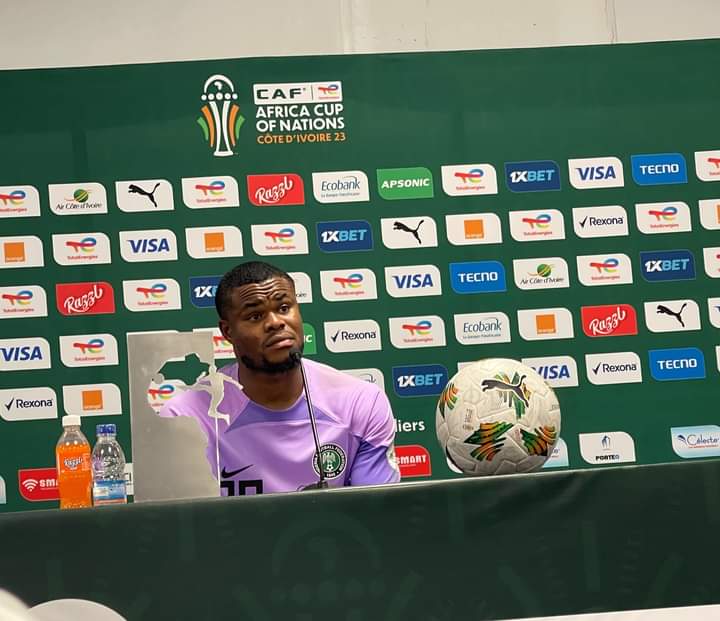
After all said and done, will the historical triumph of 2013 AFCON repeat itself for the three-time African champions to make it fourth against the hosts Côte d’Ivoire at the final showdown of the 34th edition of the Africa Cup of Nations?
